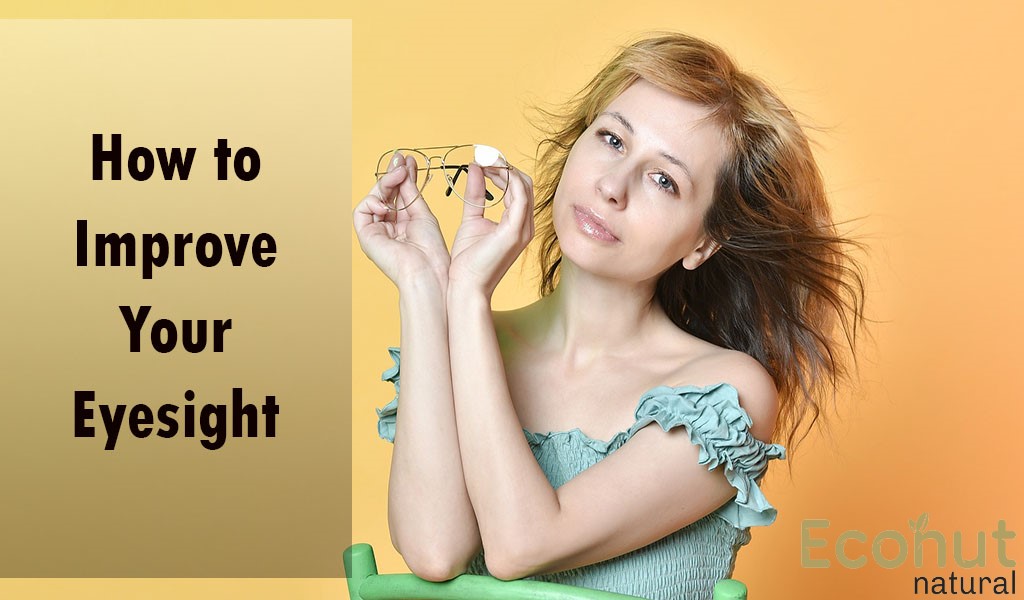Your sight is like a gateway to your overall health. Having a good eye-sight can reduce several risks.
Not many people care about their sights until they have a problem with it.
Today, In this post I’m going to discuss some of the ways to improve your eyesight as you age.
How to Improve Your Eyesight?
1. The flower magic
Fix your gaze on a flower and the detail you can see is mind-blowing. Yet most of us take this for granted , and rarely ponder the amazing process that enables us to see.
Rays of light enter the eye and are focused onto a thin layer of nerve tissue called the retina, which lines the inner surface of the eye.
The retina contains millions of specialized light-detecting cells- photoreceptors- which collect light energy and register it as electrical signals.
These signals then travel along the optic nerve to the brain, which interprets them as the images that fill the world around you.
Photoreceptors are among the most active cells in the body. In each cell, folds of the membrane are continually shed and reformed in response to light.
Because of this constant process of regeneration, photoreceptors need large amounts of oxygen and other essential nutrients to keep them healthy.
2. The see-food diet
Eating a good, balanced diet is one of the kindest things you can do for your eyes, says Chaktty.
A diet rich in antioxidants (such as vitamins A, C, E, and flavonoids) may help reduce the damage wreaked by pollution and age.
Recent research from the US found that people who ate three or more servings of fruits a day were 36 percent less likely to develop AMD than people who ate less than 1.5 servings.
Anthocyanidins, which are found in blue, red, and purple fruits and vegetables like blueberries, red onions, and radishes, have been linked to improved blood vessel health. A diet high in leafy vegetables may also be beneficial.
Chemicals called carotenoids, particularly zeaxanthin and lutein, play a key part in keeping the macular healthy.
Smokers- who are at increased risk of AMD – have low levels of zeaxanthin and lutein in the macular.
Other studies suggest high doses of vitamins C and E, beta carotene and zinc could postpone AMD.
3. Make sure you get enough of the essential vitamins and minerals
Vitamins A, C, and E, in addition to the mineral zinc, contain antioxidants that can help stop macular degeneration. The macula, the part of the eye that controls central vision, deteriorates in this condition.
These vital nutrients can be found in a wide range of colorful fruits and vegetables, such as:
- carrots
- red peppers
- broccoli
- spinach
- strawberries
- yam
- citrus
Food sources wealthy in omega-3 unsaturated fats, like salmon and flaxseed, are additionally suggested for better eye wellbeing.
4. Don’t forget the carotenoids
Carotenoids and a few other nutrients are also important for improving vision. Carotenoids like lutein and zeaxanthin, which are found in the retina, are two examples. They can also be found in eggs, broccoli, zucchini, and leafy green vegetables.
Supplements containing lutein and zeaxanthin are also an option. These carotenoids assist with safeguarding the macula by further developing shade thickness in that piece of the eye, and engrossing bright and blue light.
5. Maintain your fitness
Yes, working out and eating well can benefit your eyes as well as your waistline. Eye blood vessels can be damaged by type 2 diabetes, which is more common in people who are overweight or obese.
Trusted Source calls this condition diabetic retinopathy. Your arteries’ delicate walls are damaged when you have too much sugar in your blood. Diabetic retinopathy causes the tiny veins in your retina — the light-delicate back piece of the eye — to spill blood and liquid into the eye, hurting your vision.
Your risk of developing type 2 diabetes and its numerous complications can be reduced by regularly checking your blood sugar levels and remaining fit and trim.
6. Oversee ongoing circumstances
Diabetes isn’t the main sickness that can influence your vision. Trusted Sources, other conditions that can affect your eyesight include high blood pressure and multiple sclerosis.
Chronic inflammation, which can harm your health from head to toe, is linked to these conditions. For instance, optic nerve inflammation can result in pain and even complete vision loss.
While an illness, for example, various sclerosis can’t be forestalled, you can attempt to oversee it with solid propensities and prescriptions. Antihypertensive medications, a heart-healthy diet, and exercise are all effective treatments for high blood pressure.
7. Wear protective eyewear
Shield your eyes from harmful ultraviolet (UV) rays by wearing sunglasses that block UV rays. Protect your eyes with appropriate eyewear whether you’re playing racquetball, working in your garage, or conducting a science experiment in the classroom.
Intense, defensive eyewear is fundamental assuming there is a gamble of synthetic substances, sharp items, or materials like wood shavings, metal shards, or even a wanderer elbow during a ball game, entering your eye.
8. Stop smoking
You know that smoking harms your lungs, heart, teeth, skin, and just about every other part of your body. That also applies to your eyes. Smoking emphatically raises your gamble of creating waterfalls and age-related macular degeneration.
Fortunately, within the first few hours of quitting, your eyes, lungs, heart, and other body parts can begin to recover from years of damage caused by tobacco.
Additionally, your blood vessels will benefit more and inflammation will lessen throughout your eyes and the rest of your body the longer you refrain from smoking.
Foods to look out for?
As well as antioxidants, try to include lutein and zeaxanthin in your diet. Lutein can be found in mangoes, bilberries, yellow peppers, and leafy green vegetables, especially kale, spinach, and broccoli.
Zeaxanthin is abundant in eggs, oranges, tangerines, corn, orange peppers, and spinach. If you don’t get enough of these fruits and vegetables in your diet, you might want to take a supplement—lutein or bilberry extract are great for your eyes.
How to improve sight at old age
As we age, it is common for our vision to change and for certain eye conditions to develop.
While it may not be possible to completely reverse age-related vision changes, there are several steps you can take to help improve and maintain your sight as you get older, Akin chaktty reiterated.
Regular eye exams
Plan customary extensive eye tests with an optometrist or ophthalmologist.
These exams can detect early signs of eye conditions and allow for timely treatment.
Maintain a healthy lifestyle
According to healthpally, leading a healthy lifestyle can improve your vision.
Consume a well-balanced diet full of vegetables, fruits, and omega-3 fatty acids. Exercise regularly to improve circulation and promote overall eye health.
Manage chronic conditions
Conditions such as diabetes and high blood pressure can affect your vision. Keep these conditions under control by following your healthcare provider’s recommendations, taking medications as prescribed, and maintaining a healthy lifestyle.
Adjust your environment
Make sure your home is well-lit to reduce eye strain. Use task lighting when reading or working on close-up tasks.
Consider using larger font sizes on electronic devices or adjusting the display settings for better visibility.
Maintaining healthy eye habits
Maintaining healthy eye habits by taking frequent breaks when reading or using a computer requires prolonged visual focus.
Follow the rule of 20-20-20: Reduce eye strain by gazing at something 20 feet away for at least 20 seconds every 20 minutes.
Make sure you wear the correct eyewear
If you have a prescription for glasses or contact lenses, follow the instructions. Health professionals suggested that you regularly update your prescription to get the best vision correction.
Consider the use of assistive devices
When performing tasks that necessitate additional assistance, you should think about using magnifying glasses, large-print books, or other visual aids to assist with reading or other close-up activities.
Stay informed
Keep up-to-date on the most common age-related eye conditions and symptoms, such as dry eye, glaucoma, cataracts, and macular degeneration. Treatment and early detection can help reduce their impact on your vision.
Keep in mind that despite the fact that these hints can assist you in improving and maintaining your vision, it is essential to meet with an eye doctor for individualized guidance tailored to your particular requirements.








